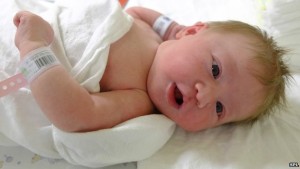The Ethics of Three-Parent Babies
Babies with three parents may be born in the United Kingdom as early as 2016, after recent legislation was passed approving three-person IVF (in vitro fertilization). The legislation allows for women with mitochondrial disease, inherited and incurable, to give birth to children without the risk of them inheriting the disease.
The procedure may be done two ways, essentially combining small amounts of DNA from a donor woman with the egg and sperm from the parents. Scientists say that the term “three parent baby” is a bit of a misnomer, as the child would only have one-tenth of one percent of the DNA from the donor.

The procedure is controversial and raises concerns about the ethics of changing DNA. There is danger of a precedent being set for the further manipulation of DNA to create “designer babies.” However, given the limited application of the law and the minimal impact it has on the actual traits of the child, such concerns seem far-fetched for the present.
Yet, the trajectory of the research certainly raises questions about the role of humanity and science in the creation of life. These questions are further complicated by a religious mindset, and particularly by a Mormon theological view. Such behavior may not be actually tampering with ‘life,’ as there is no official doctrine pertaining to when the spirit enters the body.
Some questions to consider as you evaluate your own opinions on the subject:
- Do we have a responsibility to make life as good as possible for those here on Earth?
- If so, how far does that responsibility extend? If we can improve the quality of life of someone before they are even born, should we do so?
- How do we decide what is and is not ok to change? What determines the impact on quality of life?
- What about one’s birth is foreordained by God? What is simply the result of living in a fallen world?
- Are we supposed to make the world a better place, including by advancing scientifically?
I don’t have the answers, but if we can safely alter DNA to allow thousands of children every year to live without constant, incurable pain and suffering, that seems like the right thing to do.
Further Reading/Notes
“It is a fact that a child has life before birth. However, there is no direct revelation on when the spirit enters the body.” (Church Handbook of Instruction 2: Administering the Church 21.3.10)
“Members should not feel obligated to extend mortal life by means that are unreasonable.” (21.3.8)
“The donation of organs and tissues is a selfless act that often results in great benefit to individuals with medical conditions. The decision to will or donate one’s own body organs or tissue for medical purposes, or the decision to authorize the transplant of organs or tissue from a deceased family member, is made by the individual or the deceased member’s family.
A decision to receive a donated organ should be made after receiving competent medical counsel and confirmation through prayer.” (21.3.7)
“The Church strongly discourages in vitro fertilization using semen from anyone but the husband or an egg from anyone but the wife. However, this is a personal matter that ultimately must be left to the judgment of the husband and wife. Responsibility for the decision rests solely upon them.” (21.4.7)
—Conor Hilton, Stance
You must be logged in to post a comment.